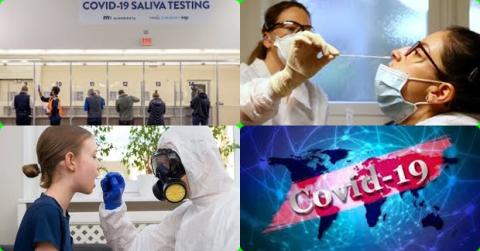
Objectives:
Nasopharyngeal swab nucleic acid amplification testing (NAAT) is the noninvasive criterion standard for diagnosis of coronavirus disease 2019 (COVID-19). However, it requires trained personnel, limiting its availability. Saliva NAAT represents an attractive alternative, but its diagnostic performance is unclear. Therefore, this review article has been conducted.
Is the diagnostic accuracy of saliva nucleic acid amplification testing (NAAT) similar to that of nasopharyngeal swab NAAT?
Study design:
This review article included 8 peer-reviewed studies and 8 preprints with a total of 5,922 unique patients.
There was significant variability in patient selection, study design and stage of illness at which patients were enrolled.
15 studies included ambulatory patients and 9 exclusively enrolled from an outpatient population with mild or no symptoms.
Results and conclusions:
The investigators found in the primary analysis, the saliva NAAT pooled sensitivity was 83.2% [95% credible interval = 74.7% to 91.4%] and the pooled specificity was 99.2% [95% credible interval = 98.2% to 99.8%].
Results were similar in secondary analyses.
The investigators found the nasopharyngeal swab NAAT had a sensitivity of 84.8% [95% credible interval = 76.8% to 92.4%] and a specificity of 98.9% [95% credible interval = 97.4% to 99.8%].
Results were similar in secondary analyses.
The investigators concluded that saliva NAAT diagnostic accuracy is similar to that of nasopharyngeal swab NAAT, especially in the ambulatory setting. These findings support larger-scale research on the use of saliva NAAT as an alternative to nasopharyngeal swabs.
Original title:
Comparison of Saliva and Nasopharyngeal Swab Nucleic Acid Amplification Testing for Detection of SARS-CoV-2: A Systematic Review and Meta-analysis by Butler-Laporte G, Lawandi A, […], Lee TC.
Link:
https://pubmed.ncbi.nlm.nih.gov/33449069/
Additional information of El Mondo:
Find more information/studies on coronavirus right here.